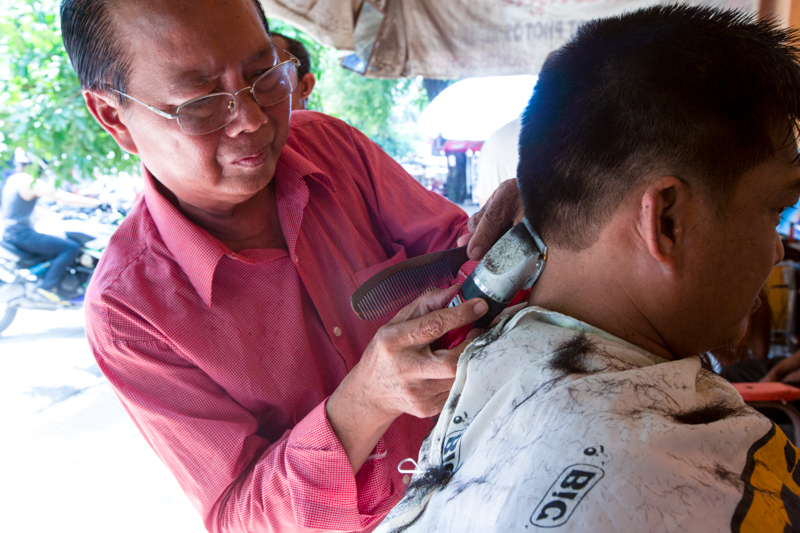Photos by Fabien Mouret.
Below the corrugated tin roof shading his chair, mirror and desk, Kim Bounthan lightly taps the edge of his razor precisely against the miniscule hairs on the back of a customer’s neck. As he put down his clippers and picked up a pair of scissors, Mr. Bounthan joked that he became a barber because he had no other choice.
Many of the barbers who populate the streets of Phnom Penh trace their hair-cutting roots to their time living under the Khmer Rouge, where either because of their parents or out of pure necessity they were tasked with handling the universal need of trimmed hair.
Mr. Bounthan, a 54-year-old Svay Rieng native, thought back to his childhood when he began cutting hair at 10 years old for other children living in a Khmer Rouge work camp. Back then, he said, he would not have even called himself a barber because of the crude, rudimentary haircuts he used to give his friends.
“Because there were no schools at the time, I learned how to actually cut hair from my father, who was also a barber,” he said. “I’ve been cutting hair ever since.” Mr. Bounthan said he has been cutting hair in Phnom Penh since 1993, and although he is starting to have health issues as he ages, he said he loves his job. Charging 6,000 riel per haircut, he says he earns 50,000 riel a day and has been able to put both of his children through school with the money he makes.
Because of their relatively cheap prices, the street barbers see a wide variety of customers. Both locals and expats use these barbers, who charge anywhere from 4,000 riel and 6,500 riel per cut, for a wide variety of styles.
Sixty-five-year-old Kim Tith began cutting hair in Phnom Penh in 1983. Mr. Tith got his start during the Khmer Rouge as well, where he was forced to cut everyone’s hair in a camp where he lived.
“I worked with two women who cut women’s hair, and I cut men’s hair,” he said as he lightly shaved the sides of a customer’s head. “I cut everyone’s hair; soldiers, prisoners, old, young. It did not matter. But I was afraid to cut the soldiers’ hair because I did not know what would happen if I made a mistake.”
Despite having seven adult children who already have families of their own and a wife living in the US, Mr. Tith still cuts hair at the same stand because he loves his work.
“At my age, this job is perfect because it is easy for an old man like me to do,” he said. “It will be good because now I can save up and retire soon.”





